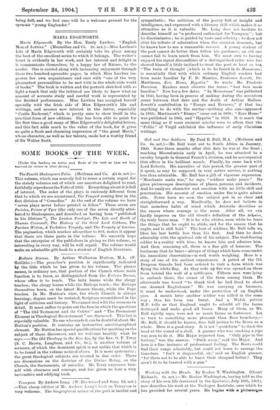God and Our Soldiers. By Paul B. Bull, M.A. (Methuen
and Co. 6s. net.)—Mr. Bull went out to South Africa in January, 1900. Some three months after this data he was at the front ; reaching Bloemfontein early in April, he was attached • to a cavalry brigade in General French's division, and he accompanied that officer in his brilliant march. Finally, he came back with Lord Roberts. His narrative of this period, the greater part of it spent, as may be supposed, in very active service, is nothing less than admirable. Mr. Bull has a gift of vigorous expression. "Merchants make war," he says, "soldiers make peace." He gives picturesque descriptions of places, persons, and incidents. And he analyses character and emotion with no little skill and penetration. His account of emotion under fire is quite admir- able. Never have we seen the subject put in so clear and straightforward a way. Manifestly, he does not believe in that nameless habit of mind which Aristotle describes as the excess where courage is the mean. After all, we can hardly improve on the old Greek's definition of the lu4pE7os, the truly brave man. "It is he who abides, even while he fears the things that he ought to abide, and for the reason that he ought, and is still bold." The best of soldiers, Mr. Bull tells us, likes his last battle less than his first. And then he deals admirably with the spiritual side of his subject. The God-fearing soldier is a reality with him ; he knows him and admires Min. And then, seasoning all, there is a fine gift of humour. The testimony that he bears—always of things which have come under his immediate observation—is well worth weighing. Here is a story of one of his earliest experiences. A patrol of the 7th Dragoon Guards had been ordered to visit a farm which was flying the white flag. As they rode up fire was opened on them from behind the wall of a cattle-pen. Fifteen men were lying in ambush there, the owner of the farm among them. He afterwards was heard " to thank God he had lived to shoot one damned Englishman." He was carrying on business, it must be understood, under the protection of an English pass. A month later another soldier was killed in the same way ; then his farm was burnt. And a Welsh patriot M.P. tells us that England ought to rebuild all the farms destroyed and make good all losses. Many of them, as Mr. Bull rightly says, were not so much farms as fortresses. Let us turn to something more pleasant than Boer treachery,— Mr. Bull, it should be known, does full justice to the Boers as a whole. Here is a good story. It is not "good form" to duck the head at the sound of a shell. A gunner who was smoking a pipe was seen to do it. His Major reproved him. "Only pipe in the battery," was the answer. "Duck away," said the Major. And here is a fine instance of professional feeling. The Boers could find their range admirably, but could not learn to manage the time-fuse. "Isn't it disgraceful, sir," said an English gunner, "for them not to be able to burst their shrapnel better ? They aren't fit to be trusted with a gun."






































 Previous page
Previous page